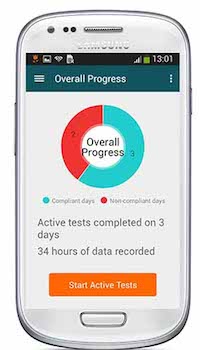 |
| App to monitor Parkinson's patients--Courtesy of Roche |
Roche ($RHHBY) is using smartphones to gather data on participants in a Parkinson's disease clinical trial between site visits. The devices will enable both active and passive data collection, with patients being asked to complete daily tests and smartphone sensors gathering information as they go about their lives.
Patients in the Phase I clinical trial--which Roche is running with its Parkinson's disease collaborator Prothena ($PRTA)--have received a Samsung Galaxy S3 Mini loaded with a data collection app. Each participant is expected to carry the device for the duration of the 32-week trial and use it daily to complete 6 tests. The 30-second tests build on work done by Max Little, who has pioneered the analysis of voices to detect Parkinson's disease. One of the daily tasks for participants is to say the "aaah" sound for as long as possible.
If successful, the project will give Roche access to a previously-unachievable breadth and depth of data. "The app will enable continuous measurement of [Parkinson's disease] fluctuation every day and throughout the day. Ultimately, we hope the app can be used in future clinical development to enable more objective measures on response to treatment to complement doctor assessments," Anirvan Ghosh, head of neuroscience discovery at Roche's pRED, said in a statement. Such objective measures could help Roche when it comes to filings to regulators and negotiations with payers.
However, while the potential of the app to predict Unified Parkinson's Disease Rating Scale (UPDRS) scores using data gathered by having participants tap on screens and holding the smartphone in an outstretched hand is significant, Roche knows mundane difficulties could scuttle its ambitions. Part of the objective is to assess participants' willingness to adhere to the testing regimen. At 30-seconds long, the 6 tests will occupy little of the participants' time but whether they will do them every day for 32 weeks and carry the device at all times is an open question.
- read the release
- and FierceMedicalDevices' take